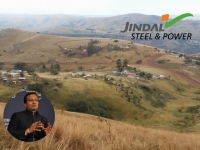Villagers Escalate Fight to Stop Jindal’s Iron Ore Mine in KwaZulu-Natal, South Africa

Residents of Makhasaneni, KwaZulu-Natal province, South Africa, are escalating their fight to stop Jindal Africa’s plans to build a $2 billion iron ore mine project that threatens to displace as many as 3,000 people and severely impact the local environment.
The villagers of Makhasaneni in the hills of KwaZulu-Natal grow avocados, bananas, citrus fruit, sugar cane as well as macadamia nuts. If the mine goes ahead, their land will be torn up to excavate as much as 32 million tonnes of magnetite ore a year to be shipped to India or Oman via the port of Richards Bay.
The mine operator and ultimate beneficiary is Jindal Steel and Power Limited, a subsidiary of the Jindal Group, one of the largest electricity, iron and steel conglomerates in India, which is owned by the billionaire Jindal family from Haryana state.
Jindal’s geologists have been exploring in the area since 2011 with permission from Ingonyama Trust, an entity created to manage Zulu communal lands in KwaZulu-Natal. But locals say that the exploration was in violation of the Informal Land Rights Act which requires developers to consult with the users of the land.
"We are a community of farmers. The mine did not consult with us," Mehlomakhulu Simelane, a local resident, told the Sowetan, a South African newspaper. “We just woke up one day and saw big machines and people working here.”
“We have fought against relocation, chopping of trees and medicinal plants. We want the environment to remain the way it has always been,” Mbhekiseni Mavuso, a local land rights activist with the Alliance for Rural Democracy, told the same newspaper. "Mining is not development. It is a mass eviction process."
At the time, the company claimed that it has met the legal requirements. “Yes, we consulted them,” Jindal’s social head, Nozipho Dlomo, told the Mail & Guardian newspaper. “If any memorandum of understanding were to be signed it would have been between the traditional council and prospecting company.”
Indeed, experts hired by the mine don’t disagree about the impact. “The project area is a rural area. People live in their homesteads with livestock and there are lots of plants and vegetation. The rivers flowing are clean, there isn’t traffic, etc," Matthew Hemming, an environmental consultant hired by Jindal, told the Daily Maverick. "Once the mine is there that will all change. The local people’s lives and the things that they know will be gone.”
The local villagers won a temporary reprieve in January 2016 when the company withdrew its request for environmental clearance, after the price of iron ore fell on global markets.
After the passage of the Traditional and Khoi-San Leadership Act of 2019 which provided local chiefs the power over their traditional lands (as opposed to the individual community members), Jindal decided to move forward again, with help from Chief S.T. Zulu of Entembeni, the local leader.
Community activists were furious. “We know that sometimes our land rights are not properly written in the law. But we know that traditionally we have a land right,” Mavuso told the makers of This Land, a documentary produced by Plexus Films. “We are trying to show not only the chief, even the king that we are the landowners here.”
“There’s a pattern wherever there are resources that that business can make money from,” Sithandiwe Yeni, a researcher at the Institute for Poverty Land and Agrarian Studies at the University of Western Cape, told Mongabay, an environmental website. “Now it’s a power game. These people are imposed; they are not elected. If you challenge them, you are threatened [by anonymous people].”
This year, the fight to stop the mine has escalated. Entembeni Crisis Forum, a local community group, launched a petition on Change.org on July 24th 2023, to get supporters to ask King Misuzulu Zulu to intervene and for the South African Department of Mineral Resources to deny the exploration license. (The petition had gained over 7,500 signatures by early October.)
That same week, a group of farmers blocked the R66 provincial highway to protest the mine. “Please pack all your stuff and leave our area. We don’t want to see you here tomorrow morning," a local resident told mine workers, in a quote reported by the Independent Online.
Jindal closed its offices in wake of the protests. “While striving to meet the legal requirements for environmental authorisation, it is crucial that we prioritise the safety and well-being of both our office staff and community members visiting our premises," Lindelihle Gcabashe of Jindal Africa’s told Scrolla. “The threatening communication the company is receiving from the Entembeni Crisis Forum poses potential risks to the safety of our personnel, as well as the community at large."
However, Jindal is still planning to move forward and is now planning to move as many as 300 local graves, in order to begin digging the first extraction pit which is expected to be 4 kilometers long, 1 kilometer wide and about 300 meters deep.
The company continues to insist that it is operating within the law. “All resettlement decisions will be made in consultation with affected households,” Jindal said in a statement to the media. “If graves are to be exhumed, the exhumation of graves will follow the legal requirements.”
Meanwhile, local activists are trying to build their case against the mine with data from similar operations. Zimbisule Zulu, a community activist from Matshansundu village, visited Kiepersol Colliery, a Jindal coal mine in Mkhondo, Mpumalanga province which lies north of KwaZulu-Natal, and has been operated by Jindal since 2008.
“I saw poverty, dust, houses cracking. People were sick,” Zulu told Mongabay. “The community said it was a bad experience and that you shouldn’t do mining. They were promised a lot but didn’t get it. The job opportunities were short-term and now they have nothing.”



